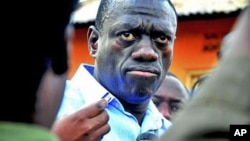Opposition leader Kizza Besigye has been placed under house arrest by Ugandan police in their latest efforts to quell the "walk to work" protests.
In their sixth week in Uganda, security forces are trying nip the demonstrations in the bud by keeping former presidential candidate and opposition figure Besigye from leaving his house.
Early Thursday, as he was leaving his house on Kampala’s outskirts, Besigye was approached by police and told to return. Uganda Police Deputy Spokesman Vincent Sekate said the marches represented a threat to the peace and security of average Ugandans.
“When he got out, he was approached by some police officers. As a preventive measure, they asked him, because of what has been happening and the consequences of the campaign, because we have seen property being damaged, various offenses being committed and all that," said Sekate. "So he was given two options: one, to either go back in his house or proceed with the policemen to the police station. So he opted to go back to his house.”
Sekate said Besigye would be allowed to leave the house “when the situation has normalized,” but did not specify further.
Ugandans have been demonstrating against rising food and fuel prices since the first march on April 11. State response to the protests has been harsh; hundreds have been arrested and injured by police trying to quiet the crowds, and at least five people have been killed. Besigye received multiple injuries, including a broken hand and severe chemical burns on his eyes, requiring treatment in Kenya.
It appears Besigye had not committed a crime before he was confined to his house, but Sekate says his detention is legal under Ugandan law.
“In our criminal procedure code act, there is section 26, which talks of arrest as a preventive measure," he said. "So the moment any police officer suspects that any offense might be committed as a result, he can arrest such a person to prevent the other crime from being committed.”
Amnesty International Representative Godfrey Odongo says such an interpretation is dangerous, however, in the context of Besigye.
"What will happen, it seems, is that every Monday and Thursday, Kizza Besigye might not be able to leave his home for the next few weeks and that would be unacceptable," he said.
Neither Besigye nor his representatives could be reached for comment.
Ugandan President Yoweri Museveni has grown increasingly hostile to the demonstrations. He has encouraged the passage of a law that would deny bail for those jailed in the protests. On Tuesday, Museveni published a letter in the state-owned New Vision newspaper that called the protesters “drug-users” and said that media, including NTV, The Daily Monitor, al Jazeera and the BBC, which “cheer on” the demonstrations, would be treated as enemies of Uganda.




